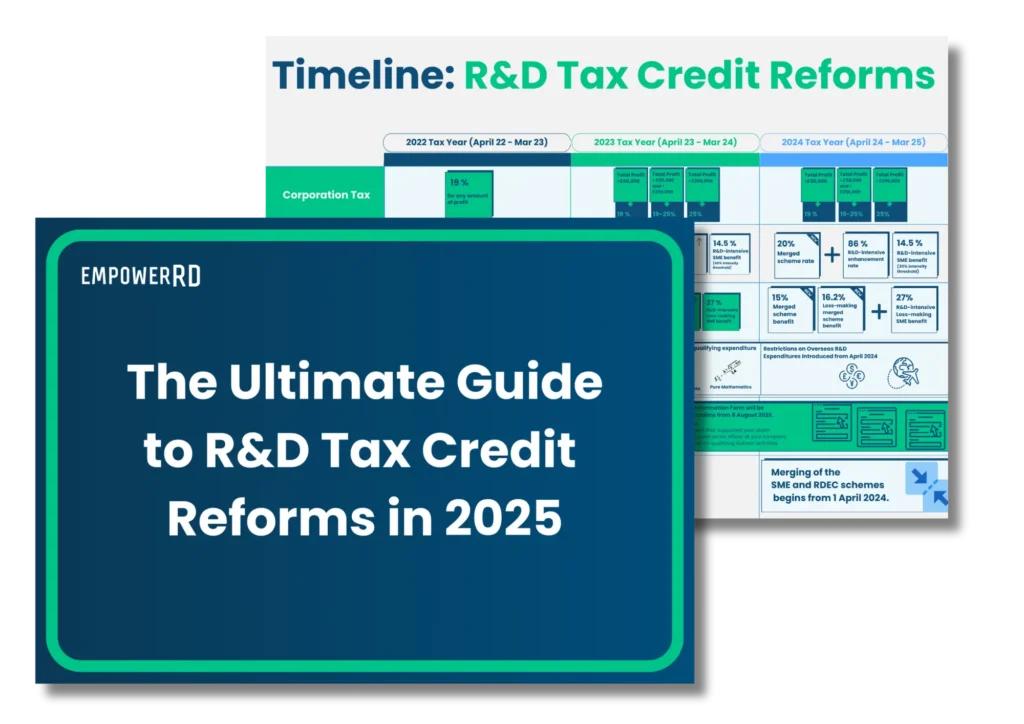Navigating the complexities of R&D tax credit claims in 2024 requires a strategic approach to minimise the risk of HMRC enquiries. Companies must prioritise accuracy, compliance, and the expertise of R&D advisors.
In this article, the third instalment in our series on enquiries, we explore key strategies to help you avoid HMRC enquiries and ensure a smooth R&D tax credit claims process.
Choose an experienced and reputable advisor
Selecting an advisor with both experience and a solid reputation is crucial. An advisor’s track record in handling R&D tax claims and enquiries is pivotal in ensuring accurate preparation and scrutiny from HMRC. To evaluate options, refer to our guide on selecting the right R&D advisor.
Accurately represent R&D costs
It is essential to represent R&D costs accurately. Including marginal or non-R&D costs can raise red flags. Seek advice on what costs qualify for your specific industry and/or activity and adhere strictly to these guidelines. In the meantime, we have a helpful guide that details the most common qualifying R&D costs.
Demonstrate precision in financial reporting
Ensuring that the numbers in your claim are correct is crucial. Errors or misrepresentations in financial data can lead to enquiries. Double-checking and verifying all financial information before submission is a prudent practice.
Avoid overclaiming on costs
Be cautious not to claim 100% on individual R&D costs unless they are fully justifiable and include contemporaneous documentation, e.g. timesheets and invoices. Overclaiming can be perceived as an attempt to inflate the claim’s value and may trigger an enquiry from HMRC.
Include a clear technical narrative
Include a technical narrative that clearly articulates the scientific or technological advances made in the industry. This narrative should explain how your project meets the R&D criteria, detailing the uncertainties encountered and how they were addressed.
This task should be carried out by a competent professional, preferably the individual who spearheaded the R&D project and is most capable of explaining the project.
The technical narrative should adhere to the new Additional Information Form requirements, which is why it is also important to seek advice from a reputable R&D advisor.
Review and discuss with advisor before submission
Before submitting the claim, thoroughly review and discuss the report with your R&D advisor. This review process helps catch any potential issues that could lead to an enquiry and ensures that your claim is as strong as possible.
Acceptance that an enquiry could happen
Finally, understand that enquiries can still happen despite taking all the right steps. They are part of the new landscape of R&D tax claims. A mindset that anticipates and is prepared for this possibility can help deal with any enquiries that arise effectively.
Implementing these strategies can significantly reduce the likelihood of an enquiry into your R&D tax credit claim. Remember, the key is in the detail and having the right expertise to guide you through the process.
Why work with EmpowerRD?
EmpowerRD offers comprehensive support for R&D tax claim enquiries, ensuring a smooth and compliant process. Our services include:
- Standard enquiry support: Our service includes standard enquiry support, making it hassle-free for our clients.
- Experienced team: Our Enquiry Response team comprises individuals with extensive expertise.
- Intuitive platform: Unlike traditional advisors who use spreadsheets and email chains to compile a claim, our platform consolidates all data, finances, and documentation in one place. This organised approach ensures a centralised data trail, making claim defence more efficient and robust.
- Client communication: We inform our clients at every stage of the enquiry process, ensuring transparency.
- Data management: We ensure that your claim report contains sufficient information and, if necessary, work closely with clients to gather additional data.
- Direct HMRC communication: EmpowerRD handles all communications with HMRC, simplifying the process for our clients.
In 2023, EmpowerRD maintained an impressively low enquiry rate of just 2.4%. This starkly contrasts with HMRC’s reported non-compliance rates for the tax year 2020-2021. During that period, a substantial 14% of claims were found to be fully non-compliant, while 38% exhibited partial non-compliance. While these rates do not guarantee an enquiry, the significant difference in averages underscores our unwavering commitment to minimising compliance issues for our clients. With meticulous attention to detail and a steadfast dedication to excellence, we consistently strive to provide our clients with the highest level of service and peace of mind.
Trusted Partner for R&D Tax Claims:
EmpowerRD has assisted over 1200+ UK companies in building optimised and compliant R&D tax claims totalling over £200 million. Our experts are here to support your business. Contact us today if you have any questions.












